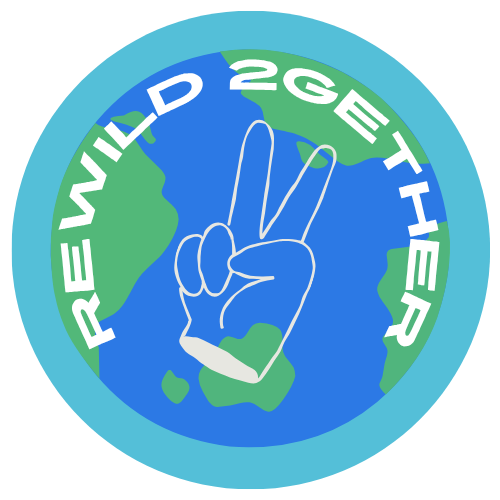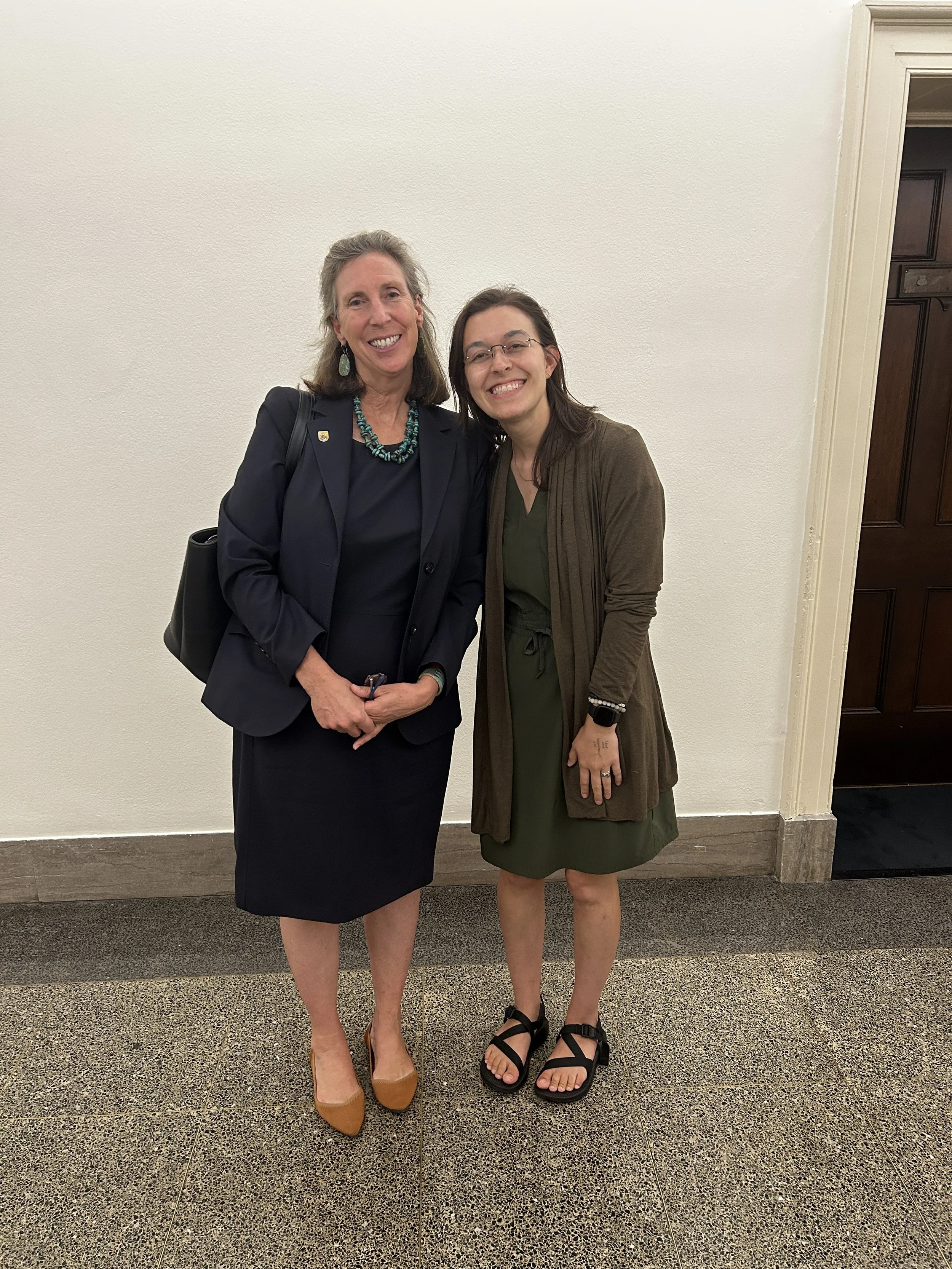In the spring of 2023, encouraged by my mentors, including Dr. Erin Meyer-Gutbrod, I began to look into potential internships that I could pursue to better mold my skills in my research. I had spent a bit of time looking into internships, only to find that many required I support myself financially during, and pay a larger amount to study overseas or similar. As this was not an option, I tried to narrow down opportunities I could take part in. After hearing about the NOAA IN FISH internship from Dr. Joe Jones, Director of the School of Earth, Ocean, and Environment, I applied, reaching out to mentors and peers for letters of recommendation to bolster my ability to take part in the internship.
I was extremely fortunate to have been chosen to participate in the NOAA IN FISH internship. During my internship, after a two-week classroom-focused period at Monmouth University where I was able to meet and work with the other 17 interns, I was placed at NOAA headquarters in Washington, D.C., where I worked with the Office of International Affairs, Trade, and Commerce as an intern. While interning at NOAA headquarters, I was partnered with staff to help with their projects, giving me an all-encompassing understanding of the work of the department. I coordinated with NOAA employees to update the previous version of the International Agreements Concerning Living Marine Resources of Interest to NOAA Fisheries, a 230-page document on fisheries policy for different regions. I contacted global fisheries representatives for updating policy language, edited and verified sections, and incorporated new agreements into the final resource. I am cited in the publication’s acknowledgements for my contributions. I assisted in recreating NOAA’s Illegal, Unreported, and Unregulated (IUU) Fishing website after attending staff meetings to coordinate updates across departments, compiled content from multiple websites into a single site for ease, and revised sections for accuracy and consistency. I prepared the consolidated draft that NOAA staff later finalized and submitted as the updated website. I explored the ecological impact of bottom trawling on deep-sea vulnerable marine ecosystems (VMEs), such as cold-water coral habitats in the North Pacific. I independently created a final presentation on the work I did during the internship in which I organized the research narrative, designed the slides, and presented the final policy recommendations. The presentation, resource and website represented the culmination of my internship and showed that I can synthesize complex science and policy information clear, public-facing work.
In studying VMEs, I analyzed scientific literature and international policy agreements to understand the full scope of the problem. What struck me most was the complexity of the issue, as no single contributor or solution could address it alone. The problem was not just ecological, but also legal, economic, political, and systemic. Major nations had withdrawn their fisheries in the North Pacific region to promote population growth for the species while other nations chose to continue fishing in the area, causing the populations to decrease. I found that of two major species fished, only one had protections in place to prevent overfishing. While the goal of my research was to present the issues and turn scientific rhetoric into easier-to-consume material, once I had done this and learned I had extra time, I took it upon myself to draft policy for the species with no protections, and it was very well received. I was informed later that the policy I drafted would be used to protect the species in question, something I never considered might happen, but was exciting to learn. What was increasingly complex, protecting multiple species while considering the economies of the nations still fishing the area, the realities of illegal fishing, and political strain, was in some way remedied by drafting policy that accounted for economic constraints while preventing overfishing. Overall, this was an incredibly satisfying experience.
I first encountered Donella Meadows’ Thinking in Systems during my NOAA IN FISH internship, where her descriptions of feedback loops and leverage points helped me make sense of the complex interactions between ecology, economics, and policy. Later, in Environmental Pollution & Health (ENVR 321), I recognized those same patterns in public health and environmental regulation, which reinforced what I first felt intuitively at NOAA: every action exists within a larger web of cause and effect.
Systems theory, as Meadows describes it, examines how the parts of a system interact through relationships and feedback loops that determine the behavior of the whole. That perspective immediately resonated with me. I began to see environmental policy as a living network rather than a collection of isolated issues, each decision rippling outward through connected systems of people, resources, and governance. What I first sensed at NOAA was reinforced in the classroom: every action, scientific or social, exists within a larger web of cause and effect.
In studying VMEs and fisheries policy, I began seeing every decision point as embedded in a web of interconnected systems. You could not talk about fishing gear without talking about trade. You could not talk about trade without talking about enforcement. And you could not talk about enforcement without acknowledging the political will of member nations within international agreements. It was all connected and messy. My Geographic Information Systems course (GEOG 363) taught me to use clear to use clear visuals and spatial reasoning, skills that shaped how I communicated complex data and made it accessible to wider audiences.
In Environmental Pollution & Health (ENVR 321) I applied systems thinking to an energy case study on South Carolina’s reliance on nuclear power and the halted VC Summer expansion. Writing that paper forced me to trace economic, environmental, and social trade-offs across scales, and how stopping construction could shift generation toward higher-pollution fuels, strain water resources differently, disrupt local jobs, and alter energy grid reliability. Framing the decision through sustainability clarified what Meadows calls feedback and leverage: each choice nudges air and water quality, public health, household energy costs, and long-term resilience in connected ways. That classroom lens later helped me read international fisheries policy with the same rigor I brought to energy systems.
Systems thinking fundamentally changed how I process information, solve problems, and navigate complexity. It is no longer just an academic theory, but it is a lens I use daily. Whether I am researching fisheries or trying to better manage my time. I now look for relationships, feedback loops, and leverage points. I have learned to zoom out, ask bigger questions, and identify the root structures behind visible outcomes.
This way of thinking also deepened during Marine Ecology (MSCI 575) where I wrote a position paper on green infrastructure as a tool for urban climate adaptation. I argued that nature-based solutions, such as permeable pavements, green roofs, and watershed-scale stormwater design, can simultaneously reduce flooding, mitigate urban heat, and improve community health. The research required balancing economic feasibility, environmental outcomes, and social acceptance, mirroring a framework I had explored in Environmental Pollution & Health (ENVR 321). Analyzing case studies from the EPA and NOAA showed me that even the most innovative climate solutions succeed only when they engage the people who live among them. This assignment strengthened my conviction that sustainability and equity are inseparable, and that systems thinking must extend beyond ecosystems to include the human networks that sustain them.
This insight has shaped how I see my future. I am no longer interested in only working on single-issue environmental problems. I want to help design policy systems that acknowledge nuance, operate across sectors, and prioritize long-term resilience. Whether I am contributing to marine conservation, climate policy, or environmental justice, I want to lead with this systems mindset, and help others develop it, too. This leadership initiative grows directly from my Research pathway, turning data analysis and science communication into community action.
Artifacts:
Beyond the Classroom Artifact 1: NOAA IN FISH Final Presentation
Beyond the Classroom Artifact 2: NOAA International Agreements Concerning Living Marine Resources of Interest to NOAA Fisheries, 2023
Beyond the Classroom Artifact 3: NOAA Fisheries International Affairs: IUU Fishing
Within the Classroom Artifact 1: ENVR 321 – Nuclear Case Study
Within the Classroom Artifact 2: MSCI 575: Green Infrastructure Position Paper



